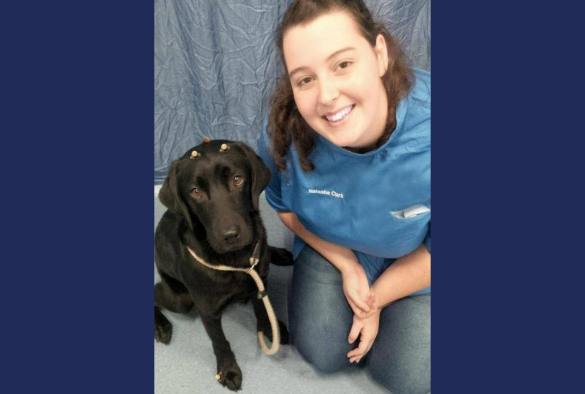Natasha Clark is a veterinary PhD student in her second year. Her project focuses on the detection of early mobility problems in dogs via the use of a newly developed owner-reported mobility questionnaire. Natasha is based at the Institute of Life Course and Medical Sciences and undertakes her work in the specialised ‘Gait Lab’ on campus at the University of Liverpool. Here dogs can have their movement tracked and scanned using state of the art technology.
Veterinary to research
I have always wanted to be a vet and I was regularly found “treating” our family dog with my toy stethoscope and syringe as a child. This love of animals prompted me to study Veterinary Medicine at the University of Nottingham (2015-2020). Equally, I have always loved conducting research, I find it so exciting to investigate the unknown and potentially have the means to make a difference with my findings.
Throughout my undergraduate veterinary degree, I participated in various summer research projects investigating everything from elephant housing in Africa to flea infestations in dogs – however, the research projects all had one common theme, to improve animal health and welfare. Hence, I knew this was the difference I wanted to make following graduation.
In September 2020, I started my MPhil at the University of Liverpool. The Dogs Trust funded project intended to validate a newly designed owner-reported mobility questionnaire (GenPup-M) that aimed to detect subtle changes in a dog’s mobility and highlight any concerns. The overarching aim was to allow these subtle mobility changes to be detected earlier and help to improve canine health and welfare – this work resulted in my first publication, a review on the various assessments used to detect mobility issues in dogs. After my MPhil, I was successful in securing another grant from Dogs Trust to continue my work onto a PhD investigating long-term (longitudinal) changes in a dog’s mobility over a 3-year period (2022-2025).
Why study mobility problems in dogs?
Mobility-related problems are the third most prevalent disease in dogs and it is estimated that 200,000 dogs are affected with musculoskeletal disease annually. Although is it estimated that 20% of dogs have mobility problems before 1 year old, many dogs aren’t diagnosed until they are 8-13 years old. Hence, many dogs end up living a large proportion of their life with painful and debilitating conditions which negatively impact their health. This delay in diagnosis is mainly due to dogs displaying subtle changes in their gait or behaviour initially which only progresses to more pronounced lameness once the joint becomes severely diseased. Many owner-reported questionnaires have been developed for dogs already diagnosed with mobility problems and monitor their quality of life, however (prior to my MPhil), no questionnaires had been developed that could be used in healthy animals throughout their life to highlight changes in mobility/activity levels.
My PhD
Broadly, my PhD project aims to validate the longitudinal use of the new mobility questionnaire (GenPup-M) in a group of 60 Labrador retrievers over 3 years. Dog owners will be asked to complete the mobility questionnaire annually and bring their dog to the specialised gait laboratory for a veterinary clinical examination and 3D gait analysis. In both human and veterinary medicine, 3D gait analysis is considered the ‘gold standard’ method of analysing mobility as it can detect minor changes in the forces exerted through the limb, differences in stride lengths/widths, speed and joint angles. By correlating the dog’s gait data with the findings from the clinical examination and owner-responses to the questions, we can determine if subtle changes in mobility can aid early detection via mobility questionnaires.
Beyond my PhD
I have recently had the results from my MPhil project accepted for publication; this will allow the owner-reported questionnaire (GenPup-M) to become open-access and free for veterinary professionals and owners to use. We anticipate the questionnaire will be used by owners and vets at annual health checks or vaccinations to monitor a dog’s mobility and prompt any necessary lifestyle and therapeutic interventions for the dog. More excitingly my supervisors and I are working to create a canine mobility App to enhance the health and welfare of dogs. Furthermore, the App can be used for similar studies such as an ongoing study to greater understand the intricacies of canine anatomy and movement (detailed here). There are lots of applications this information can be used for and we hope to give owners greater insight into their pet’s health and have greater agency when seeing their vet. Finally, consent for data collection via the app will provide a continued platform for canine mobility research at the University of Liverpool.
